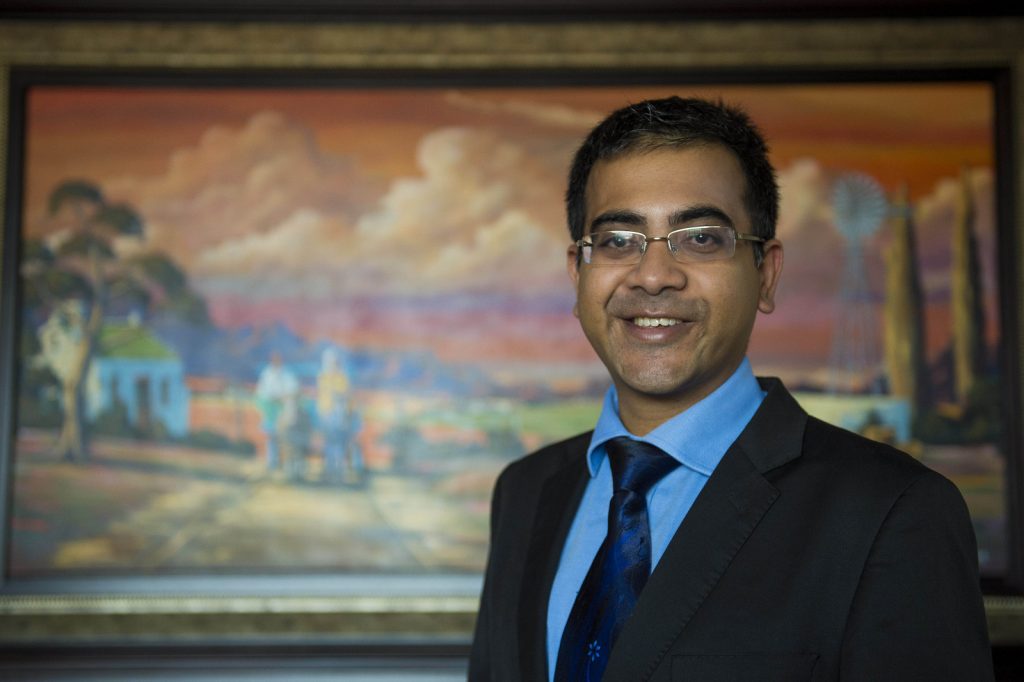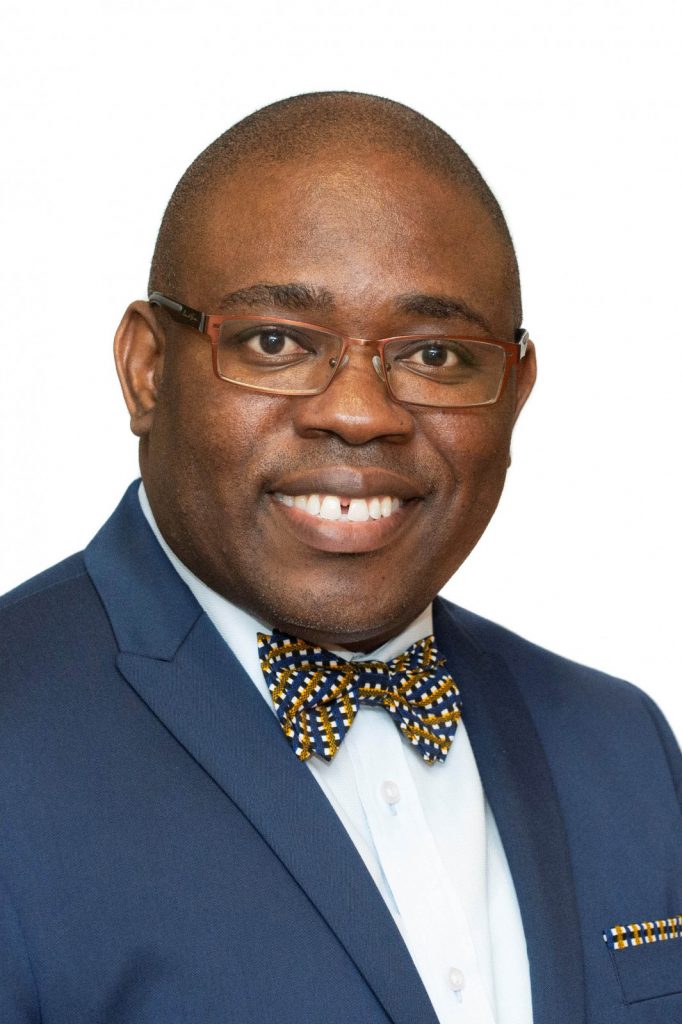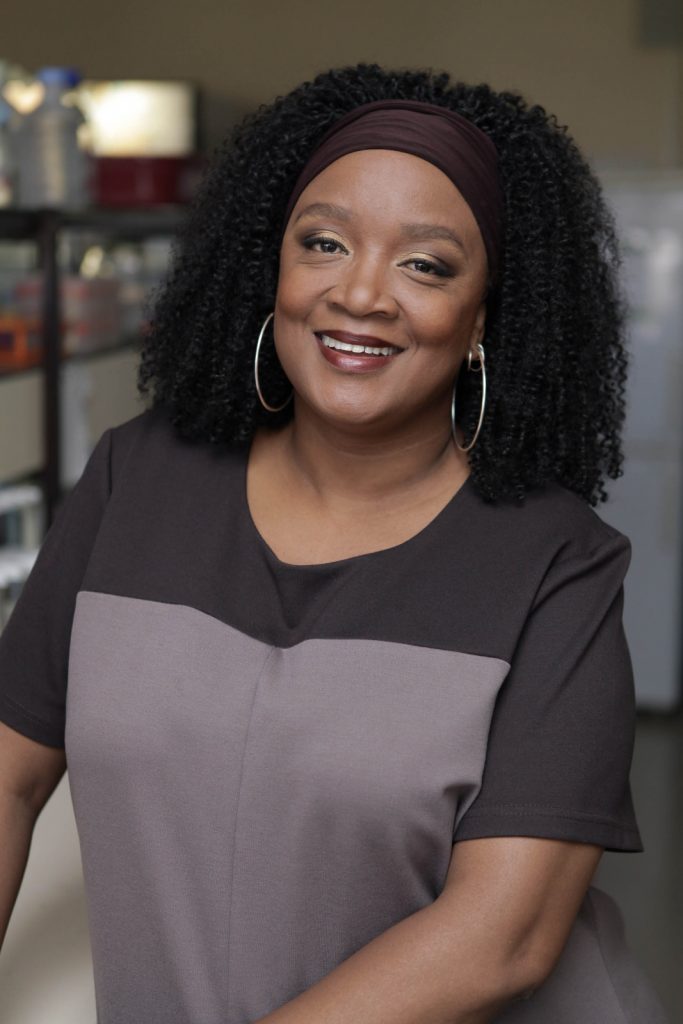Strong academic credentials: Professor Zodwa Dlamini. Photo: Mariki Uitenweerde
The race to become the next University of Johannesburg vice-chancellor is getting heated, amid claims a gender and race battle is being waged to influence the outcome.
Lobby groups are working hard to ensure their candidate woos the university community and, ultimately, the selection panel, with some prioritising an African candidate, and others a woman, to get the top job.
But the incumbent, Professor Tshilidzi Marwala, insists he has no preference for who succeeds him.
“I don’t have a favourite; I keep hearing rumours that I do. But let the best woman or man win. The university will go through its processes; I have no part in the selection process and will be on the sidelines,” he said.
Marwala, who takes up a position as rector of the United Nations University in Tokyo, Japan, on 1 March, said he had worked with all four candidates on the shortlist.
“Whoever gets the job will inherit the most dynamic university on the African continent. And I trust that the person will take care of it and move UJ from strength to strength,” Marwala said.
Lobbying began before the chairperson of the UJ Council Mike Teke announced the four candidates to replace Marwala on Monday, with candidates and groups caucusing widely on and beyond campus.
Three UJ staff members, current deputy vice-chancellor for academics Professor Letlhokwa George Mpedi, deputy vice-chancellor for research and internationalisation Professor Saurabh Sinha and the executive dean of the Faculty of Science Professor Debra Meyer are competing for the job.
Highly rated researcher Professor Zodwa Dlamini, director of the Pan African Cancer Research Institute at the University of Pretoria, is the only external candidate. She is said to have strong support among those on campus saying it is high time a woman led the university.
Working against her is a perceived lack of administrative experience, however, she does have strong academic credentials.
Dlamini is a professor of molecular oncology. She is the founding director and executive head of the Pan African Cancer Research Institute. She holds the DSI/NRF South African Research Chairs Initiative Chair in Precision Oncology and Cancer Prevention. She is a member of the American Association for Cancer Research Advisory Group on Sub-Saharan Africa, working to prevent and cure cancers worldwide.
The campus has been abuzz with rumours that Sinha, effectively Marwala’s second-in-command, is his favoured candidate, given they have known each other for two decades.
 Future: Professor Saurabh Sinha has developed policy around the fourth industrial revolution.
Future: Professor Saurabh Sinha has developed policy around the fourth industrial revolution.
Sinha has been in charge of the engine room at UJ, overseeing the development of strategy and business plan around the Fourth Industrial Revolution (4IR) as well as pushing the university’s drive towards reinventing itself as a leading institution on the continent.
Sinha impressed as dean, particularly in ensuring that the proportion of heads of department who are women in the male-dominated engineering faculty went from zero to 40%.
Sinha was shortlisted for the job of vice-chancellor at the University of the Witwatersrand, but lost to Professor Zeblon Vilakazi in 2020.
According to academics interviewed, there is a push to ensure an African candidate or woman gets the job, with a strong lobby behind Dlamini.
At the same time, Mpedi, a scholar with a legal background, has support from student organisations on campus. Insiders suggest should the nod go to an African candidate, given his experience as part of Marwala’s executive team, Mpedi would be a good fit to ensure continuity.
As dean, compared to her rivals on the shortlist, UJ insiders have suggested Meyer made the cut to ensure one of her colleagues would stand a better choice of emerging victorious. They said more established academics were excluded from the list to give the UJ candidates an edge.
In terms of popularity, given the support he has received on social media, Sinha would be ahead. In particular, singing his praises have been beneficiaries of an initiative to attract poor students without the means to study, but who met the admission requirements.
But the decision will come down to the council members who represent various constituencies on campus.
Asked to share her vision for the top job at UJ, Dlamini said she would prefer not to discuss it until after she had delivered her presentation at next Friday’s interview.
Meyer, a social rights activist, said her vision was to implement advanced technologies for a tangible impact on some of the pressing societal problems articulated in the UN sustainable development goals.
“This focus is not only aligned with the institutional vision of being Africa-anchored and shaping the future but builds on the UJ’s 4IR ethos,” she said.
Meyer said South African tertiary institutions already had a strong reputation on the continent and expanding UJ’s international footprint into Africa was low-hanging fruit, which could be achieved through online offerings and physical exchanges.
On replacing Marwala, she said the support of a strong team was key to success.
“Managing change is part of the job for a vice-chancellor and new talent must be identified and nurtured in anticipation of future vacancies.
“The current team is a strong foundation, but change is inevitable, and must be managed accordingly.”
Meyer said she had a combination of local and international training and experience, in multiple sectors, such as academia, business and community service.
She said the speed at which the race for vice-chancellor was happening, though understandable, was unnerving.
“Rumours and speculation abound but it’s best to focus on what I know I can bring to the role.”
Mpedi said he wanted to take UJ into a technologically advanced future for sustainable societal impact — “from the village to the globe and beyond”.
 Legal background: Professor Letlhokwa Mpedi. Photo: Jan Potgieter
Legal background: Professor Letlhokwa Mpedi. Photo: Jan PotgieterWhile he wanted to create the conditions for a seamless transition and continuity, his vision was to provide the intellectual capstone that brings these potentially contradictory themes together for a future for the university grounded in purpose — the purpose of deliberately and actively addressing the significant challenges of our time and place to maximise our societal impact.
Mpedi said UJ had a solid executive leadership group, which was essentially a team effort under the leadership of a good vice-chancellor.
“The new VC will need to put his stamp on UJ’s agenda in the future and not try to be another Professor Marwala.”
“I know UJ very well. I have been immersed in UJ and its legacy institutions since my student days, so I understand the cultures that merged to form UJ in its current version.
“I am deeply invested in guiding it into that uncertain future in a forward-looking way without subverting values and practices born of hard work, dialogue, compromise and a shared vision for the future.”
Sinha, an engineer, said after UJ’s strategic contextualisation for 4IR, the next step was to appropriately orient 4IR in the service of society and through the United Nations sustainable development goals.
“We are interested in an educational approach that makes 4IR and society inclusive and impactful. More than ever, the approach will bring together, broadly speaking, disciplines of humanities, social sciences, natural sciences, engineering and technology,” he said.
Reaching out to Africa had long been a focus.
“We are in Africa and, fortunately, several postgraduate students, postdoctoral research fellows and staff are from the same continent. In 2017, Sinha was part of the team that introduced the Africa By Bus initiative; this has given students an improved understanding of the southern African region.”
Given their bond, Sinha described Marwala, with whom he had worked side-by-side since 2013, as a great human being and leader who would be missed.
“We will continue to collaborate with him and, in future, with the United Nations University,” he said.
Staking his claim for the top job, Sinha said he had co-led the 4IR proposal and business plan development in 2018-19 and therefore was familiar with the opportunities and challenges. He had a broad understanding of global higher education and its direction and would be able to further this understanding within a national context.
Final interviews are set to take place on 16 September before a selection committee of around 20, with candidates making presentations before the senate and varsity stakeholders on 13 and 14 September. The panel comprises stakeholders from the council to the senate, external members, convocation and the Student’s Representative Council. — Higher Education Media Services
The race to become the next University of Johannesburg vice-chancellor is getting heated amid claims of a gender and race battle being waged to influence the outcome.
Lobby groups are working hard to ensure that their candidate woos the university community, and ultimately, the selection panel, with some groups prioritising an African candidate, and others a woman to get the top job.
But the incumbent, Professor Tshilidzi Marwala, insists he has no preference for who succeeds him. “I don’t have a favourite; I keep hearing rumours that I do. But let the best woman or man win. The university will go through its processes; I have no part in the selection process and will be on the side-lines,” he said.
Marwala, who takes up a position as Rector of the United Nations University in Tokyo on 1 March 2023, said he has worked with all four candidates on the short-list and would be watching from the side-lines. “Whoever gets the job will inherit the most dynamic university on the African continent. And I trust that the person will take care of it and move UJ from strength to strength,” he said.
Lobbying began before the chairperson of the UJ Council, Mike Teke, announced the four candidates to replace Marwala on Monday, with candidates and groups caucusing widely in and beyond campus. Three UJ staff members: frontrunners, current Deputy Vice-Chancellor: Academic, Prof Letlhokwa George Mpedi and Deputy Vice-Chancellor: Research and Internationalisation Prof Saurabh Sinha, are competing internally with Executive Dean: Faculty of Science, Prof Debra Meyer.
Highly-rated researcher Professor Zodwa Dlamini, Director of the Pan African Cancer Research Institute at the University of Pretoria, is the only external candidate – and said to have strong support among those on campus demanding that it is time a woman leads the university. Working against her is a perceived lack of administrative experience, but she has strong academic credentials.
Dlamini is a professor of molecular oncology at the University of Pretoria (UP). She is the founding director and executive head of the Pan African Cancer Research Institute (PACRI). She holds the DSI/NRF SARChI Chair in Precision Oncology and Cancer Prevention (POCP). She is a member of the American Association for Cancer Research (AACR) Advisory Group on Sub-Saharan Africa, working to prevent and cure all cancers worldwide.
The campus has been abuzz with rumours that Sinha, effectively Marwala’s second in charge, is his favoured candidate, given that they have known each other for two decades. Sinha has led the engine room at UJ, developing policy around the Fourth Industrial Revolution (4IR) and pushing the university’s drive towards reinventing itself as a leading institution on the continent. Sinha impressed as dean, particularly in ensuring that the number of women in a male-dominated engineering faculty went from zero to 40% under his watch. Sinha was shortlisted for the job of vice chancellor at Wits University, but lost to Professor Zeblon Vilakazi in January 2021.
But, according to academics interviewed, there is a push to ensure that an African candidate or woman gets the job, with a strong lobby staking a claim for Dlamini. At the same time, Mpedi, a scholar with a legal background, also has favourable support from student formations on campus. Insiders suggest that should the nod go to an African candidate, given his experience as part of Marwala’s executive team, Mpedi would be a good fit to ensure continuity.
As dean, compared to her rivals on the shortlist, UJ insiders have suggested that Meyer made the cut to ensure that one of her colleagues would stand a better choice of emerging victorious. They say more established academics were excluded from the list to give the UJ candidates an edge.
In terms of popularity, given the support he has received on social media, Sinha would be ahead. In particular, championing his praises have been beneficiaries of an initiative to attract poor students without the means to study, who met the admission requirements. However, the decision will come down to the council members representing various constituencies on campus.
Asked to share her vision for the top job at UJ, Dlamini said she would not like to discuss it until after she delivered her presentation at the interview next Friday.
Meyer, a social rights activist, said her vision is to implement advanced technologies for a tangible impact on some of the pressing societal problems articulated in the UN sustainable development goals. “This focus is not only aligned with the institutional vision of being Africa-anchored and shaping the future but builds on the UJ’s 4IR ethos,” she said.
Meyer said South African tertiary institutions already have a strong reputation on the continent, and expanding UJ’s international footprint into Africa is low-hanging fruit which can be achieved through online offerings and physical exchanges.
On replacing Marwala, she said the support of a strong team is key to success.
“Managing change is part of the job for a VC, and new talent must be identified and nurtured in anticipation of future vacancies. The current team is a strong foundation, but change is inevitable and must be managed accordingly,” she added. Meyer said she had a combination of local and international training and experience in multiple sectors, academia, business and community service.
Meyer said the speed at which the vice-chancellor race is happening, though understandable, is unnerving. “Rumours and speculation abound, but it’s best to focus on what I know I can bring to the role.”
 Activist: Professor Debra Meyer wants to implement advanced technologies.
Activist: Professor Debra Meyer wants to implement advanced technologies.Mpedi, on his part, said he wanted to take UJ into a technologically advanced future for sustainable societal impact – “from the village to the globe and beyond”. While he wants to create the conditions for a seamless transition and continuity, his vision is to provide the intellectual capstone that brings these potentially contradictory themes together for a future for the university grounded in purpose – the purpose of deliberately and actively addressing the significant challenges of our time and place to maximise our societal impact.
Mpedi said UJ has a solid executive leadership group, which was essentially a team effort under the leadership of a good VC. “Marwala’s shoes will not be hard to fill. The new VC will need to put his stamp on the UJ’s agenda in the future and not try to be another Prof Marwala.”
“I know UJ very well. I have been immersed in UJ, and its legacy institutions since my student days, so I understand the cultures that merged to form UJ in its current version. I am deeply invested in guiding it into that uncertain future in a forward-looking way without subverting values and practices borne of hard work, dialogue, compromise, and a shared vision for the future.”
Sinha, an engineer by trade, said that following UJ’s strategic commercialisation for 4IR, the next step is to appropriately orient 4IR in service of society and through the United Nations sustainable development goals. “We are interested in an educational approach that makes 4IR and society inclusive and impactful. More than ever, the approach will bring together, broadly speaking, disciplines of humanities, social sciences, natural sciences, engineering and technology,” he said.
Reaching out to Africa has long been a focus. “We are in Africa, and, fortunately, several postgraduate students, postdoctoral research fellows, and staff are from the same continent. In 2017, Sinha was part of the team that introduced the Africa By Bus initiative; this has given students an improved understanding of the Southern Africa region.
Given their bond, Sinha described Marwala, whom he had worked side-by-side with since 2013, as a great human being and leader who would be missed. “We will continue to collaborate with him and, in future, with the United Nations University,” he said.
Staking his claim for the top job, Sinha said he co-led the 4IR proposal and business plan development in 2018/9 and therefore was familiar with the continued opportunities and challenges.
Sinha said he has a broad understanding of global higher education and direction well and will be able to further this understanding within a national context.
Final interviews are set to take place on 16 September before a selection committee of 20, with candidates making presentations before Senate and varsity stakeholders on 13/14 September. The panel comprises a range of stakeholders from the council to the Senate, external members, convocation and Student’s Representative Council. – Higher Education Media Services.